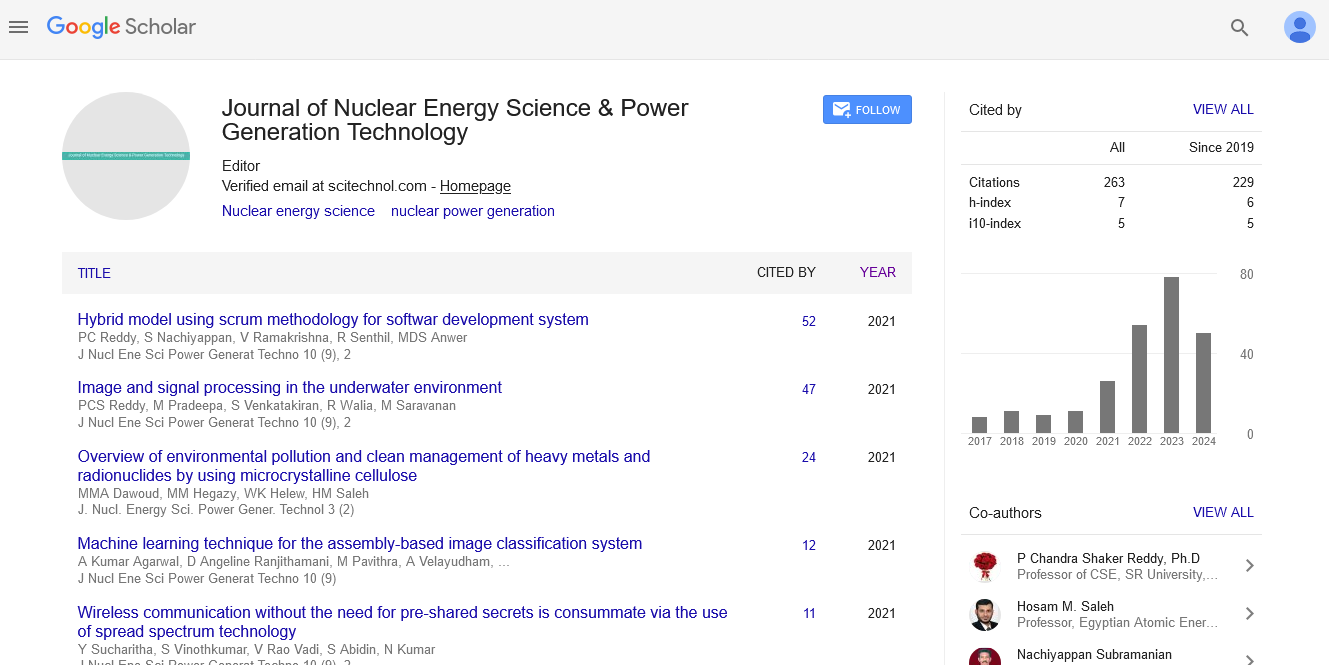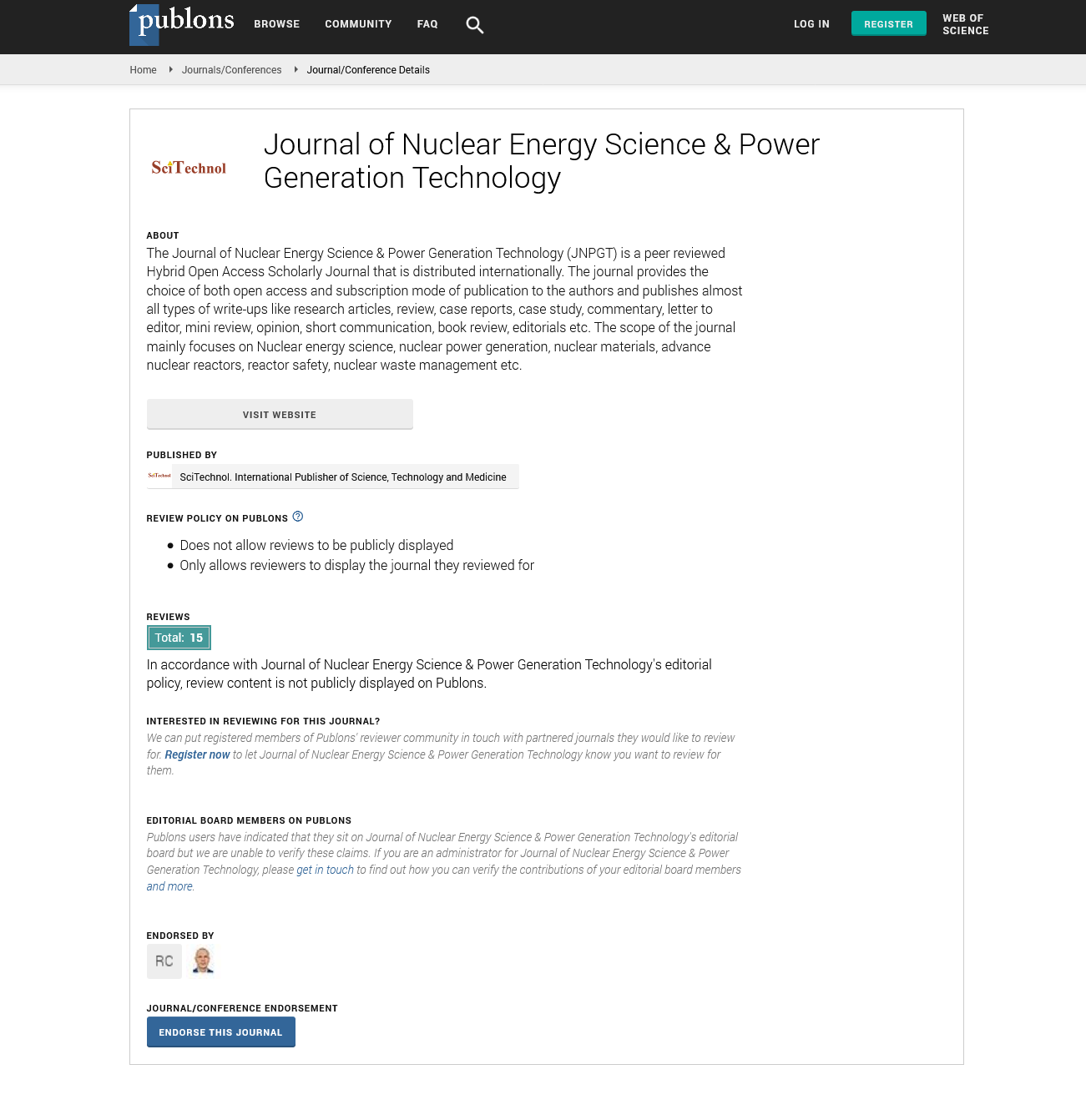Commentary, J Nucl Ene Sci Power Generat Technol Vol: 13 Issue: 1
Innovative Solutions for Sustainable Nuclear Energy: Advanced Reactor Designs for Technological Advancement
Piote Stanek*
1Department of Thermal Technology, Silesian University of Technology Konarskiego, Poland
*Corresponding Author: Piote Stanek,
Department of Thermal Technology,
Silesian University of Technology Konarskiego, Poland
E-mail: piote_stanek11@gmail.com
Received date: 23 December, 2023, Manuscript No. JNPGT-24-130439;
Editor assigned date: 26 December, 2023, PreQC No. JNPGT-24-130439 (PQ);
Reviewed date: 09 January, 2024, QC No. JNPGT-24-130439;
Revised date: 16 January, 2024, Manuscript No. JNPGT-24-130439 (R);
Published date: 23 January, 2024, DOI: 10.4172/2325-9809.1000375.
Citation: Stanek P (2024) Innovative Solutions for Sustainable Nuclear Energy: Advanced Reactor Designs for Technological Advancement. J Nucl Ene Sci Power Generat Technol 13:1.
Description
Nuclear energy has long been recognized as a low-carbon and reliable source of electricity, but traditional reactor designs have faced challenges related to safety, waste management, and proliferation risks. In recent years, advanced reactor designs have emerged as alternatives, providing enhanced safety features, improved fuel efficiency, and reduced waste production. This explores the scientific principles and technological innovations behind advanced reactor designs and their potential to transform the future of nuclear energy. A logical exploration advanced reactor designs encompass a diverse range of technologies that depart from conventional Light Water Reactors (LWRs) in terms of fuel type, coolant, and reactor architecture. One prominent example is the Sodium-Cooled Fast Reactor (SFR), which uses liquid sodium as a coolant instead of water. SFRs operate at higher temperatures and can achieve higher fuel burn up rates, resulting in greater efficiency and reduced waste production compared to LWRs. Additionally; SFRs have inherent safety features that make them less susceptible to core meltdown accidents.
Another innovative design is the Molten Salt Reactor (MSR), which utilizes liquid fluoride or chloride salts as both the fuel and the coolant. MSRs provide essential safety advantages, as the liquid fuel can drain into a passively cooled tank in the event of a loss of coolant flow. Furthermore, MSRs can use thorium as a fuel, a fertile material that is more abundant and less proliferation-prone than uranium. This opens up new possibilities for fuel cycle sustainability and reduces reliance on finite uranium reserves. Small Modular Reactors (SMRs) represent another category of advanced reactor designs that provide scalability, flexibility, and enhanced safety features. SMRs are compact, factory-fabricated reactors that can be deployed in a variety of settings, including remote communities, industrial facilities, and military installations. By standardizing design and manufacturing processes, SMRs reduce capital costs and construction timelines, making nuclear energy more accessible and economically viable.
Advanced reactor technologies
Safety and Security One of the primary advantages of advanced reactor designs is their enhanced safety and security features. Many advanced reactors incorporate passive safety systems that rely on natural phenomena, such as gravity and convection, to safely shut down the reactor in the event of an accident. Passive safety systems eliminate the need for active intervention, reducing the risk of human error and improving overall safety performance. Furthermore, advanced reactor designs provide inherent resistance to proliferation and nuclear terrorism. Some designs, such as High-Temperature Gas- Cooled Reactors (HTGRs), use ceramic-coated fuel particles that are resistant to proliferation and can be safely stored and transported. Additionally, advanced reactors can consume existing stockpiles of nuclear waste and weapons-grade material, reducing the risk of proliferation and addressing the challenge of nuclear waste management. Challenges and opportunities despite their potential benefits, advanced reactor designs face technical, regulatory, and economic challenges that must be addressed for widespread deployment. Research and development efforts are underway to optimize reactor designs, improve materials compatibility, and demonstrate safety and performance at scale. Regulatory frameworks also need to evolve to accommodate the unique characteristics of advanced reactors and ensure their safe deployment and operation.
Conclusion
Advanced reactor designs hold great promise for the future of nuclear energy, providing enhanced safety, sustainability, and security compared to conventional reactor technologies. By scientific principles and technological innovations, advanced reactors have the potential to transform the way we produce and consume energy, modifying climate change, enhancing energy security, and driving economic growth. Continued research, development, and collaboration are essential for realizing the full potential of advanced reactor technologies and helping in a new era of sustainable nuclear energy. Moreover, cost considerations remain a significant barrier to the commercialization of advanced reactor technologies. While advanced reactors provide potential cost savings over traditional reactor designs in the long term, upfront capital costs and regulatory uncertainties pose challenges for developers and investors. Continued government support, public-private partnerships, and innovative financing mechanisms will be vital for overcoming these barriers and accelerating the deployment of advanced reactors.
 Spanish
Spanish  Chinese
Chinese  Russian
Russian  German
German  French
French  Japanese
Japanese  Portuguese
Portuguese  Hindi
Hindi 

